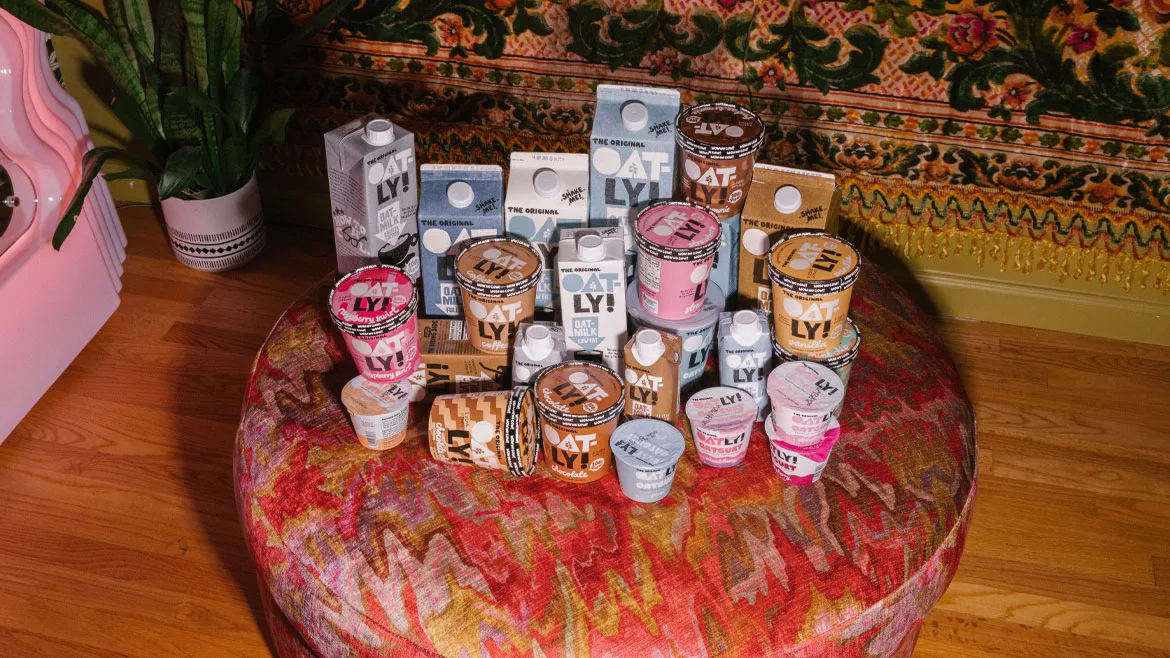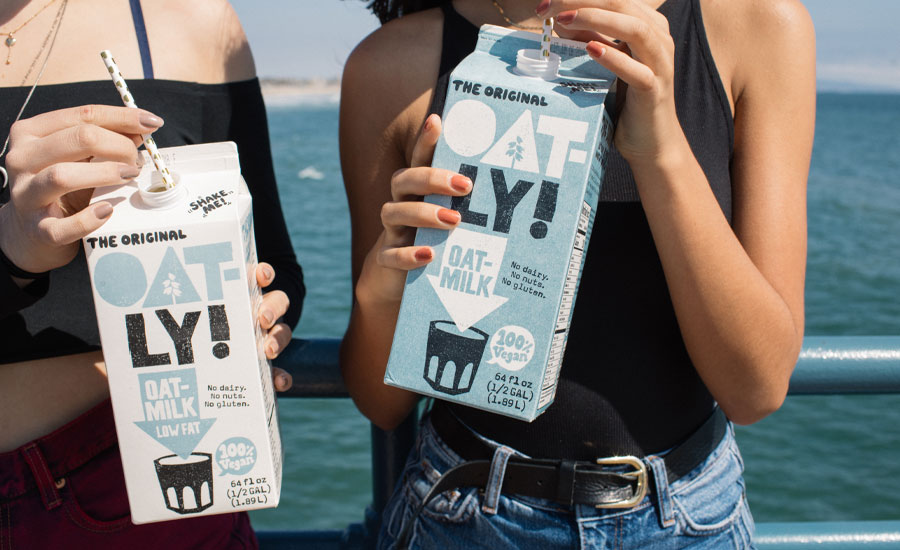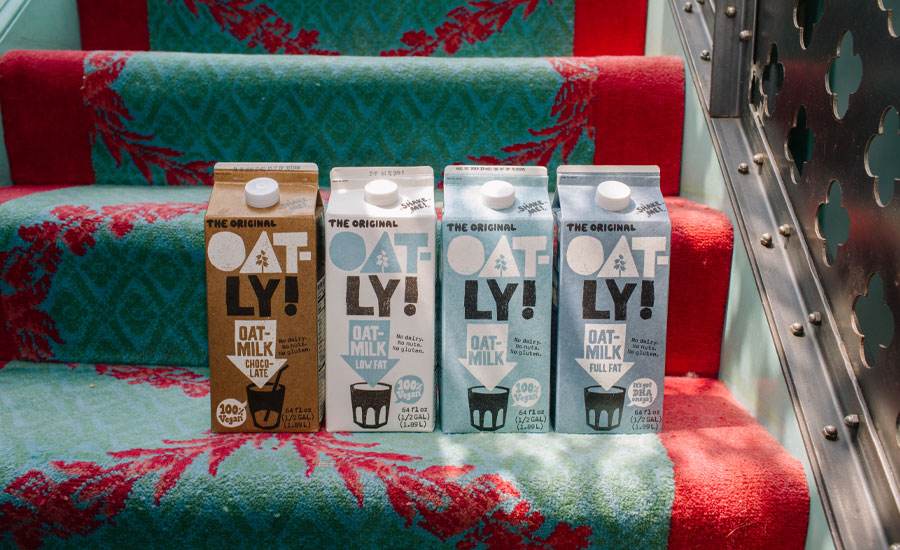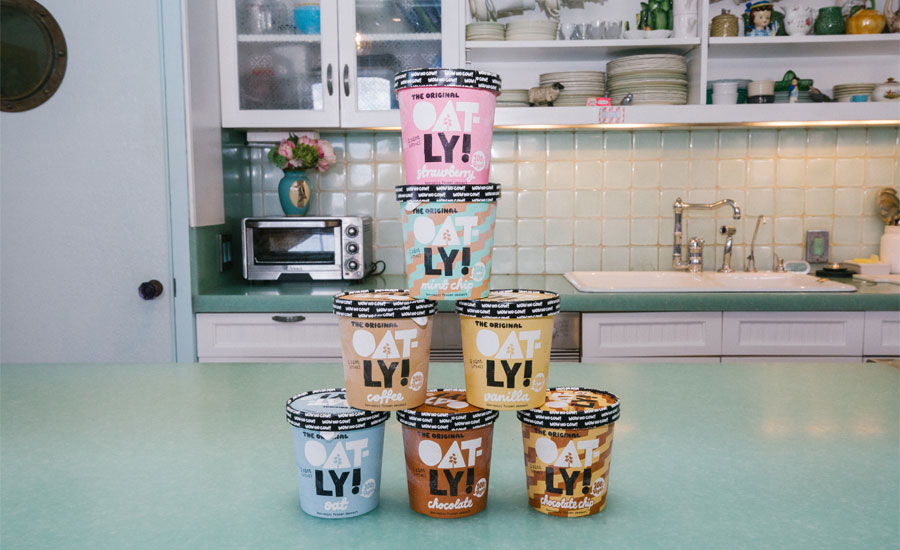Cover Feature
Oatly explores limitless potential for oat-based food, beverages
Sustainability driving forces for Sweden-based oatmilk manufacturer

A staple in many households, oats likely can be found in Americans’ pantries and cabinets in products like oatmeal porridge, oatmeal cookies or granola. However, data shows that oats increasingly are gaining a following in the beverage market through oatmilk. That following comes as the overall plant-based milks market is resonating with more of today’s consumers.
“We think consumers are adopting plant-based milks primarily for two reasons,” says Mike Messersmith, president of North America for Oatly Group AB, Malmö, Sweden. “First, is a growing awareness and concern among consumers, especially within Gen Z and millennial groups, about the future of our planet and the conscious choices that they as consumers can make to have a more positive impact on the environment.
“The second is that in the past several years there is more choice within the dairy alternatives category, with products that don’t sacrifice on taste or performance, in comparison to cow’s milk,” he continues. “Oatly is at the top of that consideration set to a large population of consumers who suffer from lactose intolerance. So, it’s a combination of nutrition and sustainability.”

Oatly’s oatmilks are created using a patented technologies, resulting in a nutritious and delicious drink with qualities similar to cow’s milk, says Mike Messersmith.
Image courtesy of Oatly
Those motivators are helping the oatmilk market gain share among the other plant-based alternatives.
For example, the oatmilk category within the total plant-based milk category grew 67% in 2021 compared with 2020 in the United States, Messersmith says. And oatmilk now accounts for 21% of the plant-based milk category in the United States, which is an increase from 15% in the first quarter of 2021, he adds.
“We continue to be incredibly excited and enthused about the growth and adoption of the oatmilk category globally within the past several years,” Messersmith says. “For the U.S. in particular, the oat category is rapidly gaining market share and surpassing other crop categories, most notably soy.
“Since 2019, we’ve also seen a decline in market share of almond milk, while the oatmilk category has taken off and has captured some of that share quickly in the past three or so years,” he continues. “What we’ve heard from consumers is that oatmilk, Oatly in particular, doesn’t sacrifice taste or performance, and among other plant-based milks, oat is one of the more sustainable options as well, with fewer emissions and needing less land and water resources.”
Committed to oats
Formed in 1994, Oatly produces products from oats, including oatmilks, frozen desserts and oatgurts. The concept of the oat-based food and beverage company stemmed from the same consumer trends that are driving the oatmilk market today.
“In the late 1980s, a research group at Lund University in Sweden including Oatly founder, Rickard Öste, set out to create a plant-based, nutritious and delicious drink with qualities similar to cow’s milk for people who were intolerant to traditional dairy and that would be inherently less taxing on the planet’s resources,” Messersmith says. “By 1990, Rickard and his team patented the process, which resulted in a milk alternative perfectly adapted for human consumption using oats ― aka oatmilk. The discovery paved the way for the formation of Oatly, with the parent company established in 1994. Since then, we’ve continued to remain committed to oats and harnessing their limitless potential.”
Messersmith explains that the patented process that Oatly utilizes for its products allows the company to keep the loose oat fiber ― the beta-glucans ― in all of its products, thereby delivering “a superior taste and mouthfeel,” he says. “No grainy, gross stuff.”
From a nutrient perspective, oatmilks include fats, carbs, protein and fibers, while also being allergen friendly, Messersmith notes. These benefits have furthered Oatly’s drive to harness the potential from the grain, he adds.
“For more than 25 years, we’ve focused on nothing but oats,” he says. “They’re an incredibly powerful ingredient and we’ve dedicated tremendous research, product development and time to exploring the limitless potential of oats.
“We have a world-class team of global food scientists and researchers who spend their days fine tuning our recipes and product formats,” Messersmith continues. “Our commitment to oats has resulted in core technical advancements that enabled us to unlock the breadth of the dairy portfolio beyond oatmilk, like oatgurt, non-dairy frozen desserts, and in European markets products like creamy oat spreads, oat fraiche and more.”
 The Oatly oatmilk line includes a Chocolate variety as well as Low Fat to meet all the needs of today’s consumers.
The Oatly oatmilk line includes a Chocolate variety as well as Low Fat to meet all the needs of today’s consumers.Image courtesy of Oatly
The legacy of Oatly’s commitment to furthering the oat-based movement was exemplified last year when it announced plans for a new research and development center.
“As far as our commitment to oats, last year in 2021, we announced plans to open a new research and innovation center at Lund University in Sweden to further explore the potential of oats,” Messersmith says. “The new innovation center will further Oatly’s leadership around oats and enable the company to accelerate its mission to drive a societal shift toward a plant-based food system for the benefit of people and the planet. Oatly expects to add approximately 30 new scientists to its global team based in Lund over the next year, with the potential to add nearly 100 researchers across its research hubs in Europe, the Americas and Asia.
“The scientists will study oats in greater detail from various perspectives including biochemistry, biophysics, microstructure, nutritional traits and refinement,” he continues. “The innovation team plans to use the knowledge to enhance Oatly’s existing robust oat-based drinks and food products as well as develop new innovation to meet the needs of consumers.”
Coming to America
Although Oatly’s journey began in the 1990s, its presence in the U.S. market was more than two decades later.
“Oatly entered the U.S. in 2017,” Messersmith says. “Back then, in the U.S, we knew that most of the population had never heard of oatmilk, so we needed to find a way to help people mentally cross that bridge and familiarize themselves with the idea of it. The second piece was that as a new brand, the biggest barrier is figuring out how to drive trial. That led to our decision to narrow our focus on where we could provide the most value.”
The company narrowed that focus to foodservice/on-premise operations versus starting at retail. It did so by encouraging brand trial with specialty coffee within foodservice.
“The barista community responded exceptionally well, they loved the product, and helped us gain incredible word-of-mouth and buzz in 2017 and 2018 in major cities throughout the country,” Messersmith says. “This entry strategy in the U.S. really springboarded Oatly and got us off the ground in a meaningful and differentiated way.”
That springboard helped its products gain solid footing throughout U.S. retail channels. In the United States, Oatly is available at more than 14,000 retail outlets and more than 38,000 foodservice establishments.
“In the U.S., our chilled 64-ounce SKUs (Original, Full Fat and Low Fat) found within grocery refrigerator aisles are our top sellers in the U.S.,” Messersmith says. “Our non-dairy frozen dessert pints also continue to grow in popularity and sell incredibly well for us. They’re available in nine delicious flavors.”
In the beverage arena, Oatly also developed the Barista Edition, an oatmilk specially formulated for adding to hot drinks.

Beyond beverage, Oatly also offers frozen desserts such as novelties and pints.
Images courtesy of Oatly
“To make this product perform to the professional expectations of baristas, we added something called dipotassium phosphate as an acidity regulator,” Messersmith says. “It keeps our Oatly Barista Edition oatmilk from separating when it hits your favorite hot drinks. But one thing you can be sure of is that there is nothing in this product that isn’t absolutely necessary or absolutely approved for consumption. Everything is plant-based, devoid of GMOs and made carefully with your health and the health of the planet in mind.”
As Messersmith noted, Oatly offers a Low Fat version of its oatmilk and even added a Chocolate variety to help meet the demands of consumers.
“For our chocolate oatmilk, we figured, why not? It’s incredibly delicious and provides an opportunity for anyone, kids and adult kids alike, to enjoy a really tasty treat that’s dairy free and vegan,” he says. “Once you try it, you’ll be hooked. It sells incredibly well for us. As for low-fat, we need to ensure that if we’re expecting people to convert from the cow’s milk options they’ve come to know, we have to have a similar variety of offerings to replace those with. Our low-fat oatmilk is simple. Just oats, water, a hint of sea salt, and some calcium, vitamins and minerals.”
These products have propelled the brand’s performance in the United States, while also motivating the Oatly team to partner with diverse entities to ensure oat-based food and beverages can be found in a variety of locations.
“We’re the No. 1 velocity brand in retail in the entire milk category, traditional dairy included,” Messersmith explains. “Our oatmilks are available for consumers to purchase at national retailers such as Target, Whole Foods, Walmart, Walgreens and CVS, as well as major regional grocery outlets like Publix, Albertsons, Harris Teeter, Kroger, Stop & Shop, Wegmans, Giant and many more.
“We need to be where consumers are looking for plant-based options throughout their daily lives and at various consumption times, so as we continue to grow, its mainstream adoption that’s key,” he continues. “For us, that means partners like Starbucks, Major League Baseball teams such as The New York Yankees, Chicago Cubs and Texas Rangers, as well as dedicated locations that are known for fun times to indulge like Menchies and 16 Handles, where consumers can pick up some of our amazing Oatly soft serve.”
To support the growing oat-based food and beverage demand in the United States, Oatly maintains two facilities in the United States and is in the process of constructing a third.
“We operate Oatly factories in Millville, N.J., and Ogden, Utah,” Messersmith says. “Our third U.S. manufacturing site is currently under construction in Fort Worth, Texas, and will be our largest factory here in the region. It’s expected to produce an estimated 150 million liters of oatmilk annually and is expected to open in 2023.”
These facilities manufacture the oatbase that are used in the development of Oatly’s portfolio.
“At Ogden, we have an end-to-end site, which means we’re able to also process and package final products at the factory,” Messersmith explains. “From our Millville, N.J. factory, oatbase is created and then transported to a network of our co-packing partners for final processing and packaging; however, one of our co-packing partners is currently building an adjacent processing facility that will create an end-to-end function at this location as well. We’re really excited for this as it will ultimately lower our transportation emissions and create even more efficiency.”
Oatly’s North America operations also are highlighting its commitment to sustainable operating practices. For example, the company announced in 2021 that two North American facilities transitioned to 100% renewable electricity.
“We have an incredible sustainability team at Oatly, and those that are focused on the North American region worked on this project tirelessly over the past year,” Messersmith says. “For this initiative, the team sourced renewable energy certificates issued for renewable electricity generated in part from our oat fiber residue as well as wind and solar. This initiative contributes in a meaningful way towards reducing our overall corporate climate footprint.”
Empowering the plant-based revolution
As Oatly looks to spread the word about plant-based food and beverages, much of the company’s motivation comes from its commitment to the planet.
“In general, plant-based milks, like oatmilk, are less taxing on the planet than cow’s milk,” Messersmith notes. “So, the greatest impact we can have as a company is to convert dairy users into Oatly consumers, empowering the plant-based revolution. We know that as we grow though, certain aspects of our corporate footprint will increase and that’s why we strive to be as responsible as we can, as we reach more people.
“To do that, we’ve outlined a set of sustainability ambitions to work toward by 2029 across our business that help us drive a food system shift, set an example as a future company and empower a plant-based revolution,” he continues. “Through these ambitions, we are constantly pushing ourselves to find tangible ways to improve including lowering our water usage, finding ways to reuse our solid waste, use renewable energy, for example.”
Messersmith identified the following global sustainability ambitions that it aims to achieve by 2029:
- “Establishing an Oatly ‘Restoration Farming’ system that supports farmers with restorative and regenerative agricultural practices to produce climate neutral oats and invest in holistic, on-farm nature-based solutions that improve soil health, land restoration and diversification in a way that benefits farmers and improves crop nutrition,” he says.
- Shifting to 100% sustainable ground transport (inbound and outbound) for Oatly’s products and materials, by employing electric vehicles, rail or vehicles using renewable fuels, he elaborated.
- Eliminating production waste to landfills by reducing waste, repurposing oat fibers residues for food or feed, and composting or converting the rest to energy, he notes.
As important as these internal ambitions are for Oatly, Messersmith explains that the company also recently developed initiatives to engage with consumers about the power of plant-based products when it comes to the environment. Last year, its creative team came up with a concept to help further Oatly’s sustainable reach.
“Last year, this team in the U.S. implemented a program that put a new spin on our Oatly merchandise (branded T-shirts, etc.), because the light bulb went off ― why are we putting new things into the world like that,” Messersmith says. “Thus, ReRuns was born. It was a pilot launched in Q4 of 2021 that gave renewed life to items already in circulation, instead of selling merchandise made from new products or materials.
“It began with limited availability in North America, with a series of releases including reimagined T-shirts in partnership with Goodfair (an online secondhand retailer saving fashion from the landfill) and one-of-a-kind, artist reimagined vintage denim jackets, and a special release of Oatly-inspired vintage holiday sweaters,” he continues. “The sweaters sold out in under one hour and all proceeds from the entire initiative went to the LES Girls Club, a local NYC organization that connects young women and gender-expansive youth of color in NYC to healthy and successful futures through free, innovative programming and mentoring.”
Another way Oatly connects with consumers about sustainability is through its packaging. For its beverage packaging, 87% of its packaging materials currently come from renewable sources, Messersmith says.
“The renewable parts are made of fiber-based materials, such as paper and board, and plant-based plastics (also known as bio-based plastics),” he explains. “We’re working hard to increase this percentage even further and we work to prioritize packaging that is made from raw materials that have the lowest climate impact and that is designed to be technically recycled.”
However, the type of packaging materials that Oatly uses isn’t the only way it furthers sustainability efforts. The company utilizes its label to educate consumers about the climate impact the products have.
“At Oatly, we also believe consumers have as much right to know the climate impact of their food as they do the ingredients and nutrition in it,” Messersmith says. “The more access people have to that knowledge, the more easily they can make decisions to choose more sustainable food options. Publishing the climate impact of food products should be mandatory and standardized, just as with nutrition labels. It’s something we’ve put into practice for many of our Oatly products available in Europe and are currently working to include carbon impact calculations for our products found in other markets, including the U.S.”
Noting that Oats can grow around the world, require less land and fewer resources, Messersmith highlights that Oatly will continue to find more ways to utilize oats in food and beverage products to support a more sustainable global food system.
“With oats as our core ingredient, we’re able to produce dairy alternatives that on average emit fewer greenhouse gas emissions than cow’s milk,” he says. “According to the UN, the global food system is responsible for about a third of global emissions, and about 50% of those emissions come from the livestock and animal agriculture industries. The greatest impact we can have as a company is to convert dairy users into Oatly consumers, empowering the plant-based revolution.”
Looking for a reprint of this article?
From high-res PDFs to custom plaques, order your copy today!





